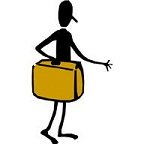|
What is the likely order of questions?Is there a typical interview format?
Most interviewers will take a logical approach to the order of questions but there is no set interview format. The most common sequence of interview questions is: 1 Questions that explore your background. These are likely to be along the lines of ‘tell me about yourself?’ and relate to your education, training & experience. The interviewer may also ask questions drawn from your CV or ask you to talk through your CV. TIP: Only tell the employer the points about your background that are relevant to the job. Offer information but keep it relevant and be brief but not too brief. Look for signals that the interviewer is happy with your answer and ready to ask another. TIP This section of the interview is your golden opportunity to show yourself in a positive light. You are the expert on ‘you’ so make sure you tell the employer what they need to know. You need to be positive and reassuring.
TIP: The way you answer these questions are important not only for the content of your answer but also because:- They allow the interviewer to assess your communication skills. i.e. how you:
This will give them an immediate general indicator on whether you are appointable and how you cope with stressful situations. 2 Questions about Skills, Abilities & Competences. In the typical order of questions the next ones will usually be to do with discovering whether you are able to do the job. They will ask for your views about yourself in the workplace, examples of your experience in certain situations and may also ask how others would assess you. Your job here is to illustrate how your skill and experience equips you to do the job on offer.
In the second half of the interview you can expect some detailed questions that assess your knowledge as it relates to the job. You may also be asked how you would respond in certain situations using case study examples or ‘What if?’ questions.
Towards the end of the interview the order of questions gets less predictable. If the interview goes well you may find yourself in the exploratory phase. Here the interviewer may not only ask you about your future intentions but also how you might develop the job if you were appointed. It may focus on where you see yourself going, how you see the job priorities and what your vision might be for the role and how you would develop it. TIP: Take care here to ‘play safe’. Do not make the mistake of having brilliant, forward thinking ideas that could be a disaster for the company. The more you know about the role the more likely you will be able to make suggestions that are practical, relevant with the right amount of creative thinking. If you do not know you can safely say you will take time to listen and learn before making plans to help make the company more efficient, more profitable, more customer focussed, leaner, more competitive or whatever the actual agenda is. 5 Questions from you. Typical interview format usually concludes with an invitation for questions from you. Safe Questions to Ask. The general advice is to ask ‘safe’ questions. Be polite and interested in the answers showing good listening skills (eye contact, smiling and nodding). Ask about 3 maximum and be alert to when the interviewers want to conclude the interview.

5 End of the Interview. In the traditional interview format the interviewer ends the interview with a thank you and information about when you will hear. Be gracious. Say, thank you. Leave with all your belongings. If you think it has gone well and you remain interested in the job say so. It will sound positive and reassure the interviewer that you remain in the frame. TIP:You can say ‘Thank you. It’s been interesting to meet you’, make eye contact and say confidently ‘If I was offered the job I would definitely be very interested’.
There are several books that give you more tips on the order of questions and model answers for all the common questions and more.
Order of Questions to Interview Answers.
Thanks for the photo to Image: ddpavumba / FreeDigitalPhotos.net
|

